|
|
|
Sort Order |
|
|
|
Items / Page
|
|
|
|
|
|
|
| Srl | Item |
| 1 |
ID:
104086
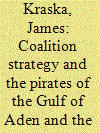

|
|
|
|
|
| Publication |
2009.
|
| Summary/Abstract |
The April 2009 seizure of the U.S.-flagged Motor Vessel Maersk Alabama and its twenty American crew members off the coast of Somalia should signal a change in counterpiracy strategy, away from a focus on major warship deployments by distant state major maritime powers, and toward development of a regional maritime security force constructed around numerous smaller patrol craft. Outside powers should focus on further advancing new international law and policy frameworks, which have become the most significant force multipliers for developing maritime security and offer the most effective approach to counterpiracy in the Horn of Africa. Complementing this effort will require a long-term program of regional maritime-security capacity building to support implementation of the new law and policy approaches. Piracy flourishes at the seams of globalization because jurisdiction is unclear and pirates exploit the inherent isolation of individual vessels and nations. Regional powers in the Horn of Africa have underdeveloped law enforcement and judicial systems and suffer from a severe lack of resources. In this setting, global and regional legal and policy frameworks in the areas of operational maritime security, judicial institutions, and law enforcement will be more effective in addressing piracy than adding another warship from an outside naval power to the equation.
|
|
|
|
|
|
|
|
|
|
|
|
|
|
|
|
| 2 |
ID:
087920


|
|
|
|
|
| Publication |
2009.
|
| Summary/Abstract |
Maritime piracy flourishes at the seams of globalisation because jurisdiction is unclear and pirates exploit the inherent isolation of individual vessels and nations. Given these dynamics, new international law and policy frameworks have become the most effective force multiplier for implementing a new collaborative approach, and the first test is the challenge posed by maritime piracy in the Horn of Africa.
|
|
|
|
|
|
|
|
|
|
|
|
|
|
|
|
| 3 |
ID:
159090
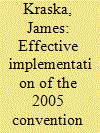

|
|
|
|
|
| Summary/Abstract |
Although the 2005 SUA Convention provides a road map for realization of the vision of an effective
global regime to combat maritime terrorism, and the need for implementation of the treaty is
perhaps even greater today, many states have not taken the necessary steps to implement it.
|
|
|
|
|
|
|
|
|
|
|
|
|
|
|
|
| 4 |
ID:
086814
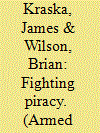

|
|
|
|
|
| Publication |
2009.
|
| Summary/Abstract |
Maritime piracy has experienced a renaissance not seen since the period of the Barbary pirates. Last year, more than 80 ships were hijacked off the dangerous waters of Somalia, and the ransom for some vessels fetches several million dollars.
|
|
|
|
|
|
|
|
|
|
|
|
|
|
|
|
| 5 |
ID:
084910


|
|
|
| 6 |
ID:
092705


|
|
|
| 7 |
ID:
091367
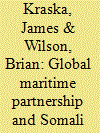

|
|
|
| 8 |
ID:
133953


|
|
|
|
|
| Publication |
2014.
|
| Summary/Abstract |
This article recounts the negotiations and emergence of Article 234 concerning ice-covered areas in the UN Convention on the Law of the Sea. As Arctic shipping increases, more vessels and flag states may be subject to the provisions of Article 234, which permit coastal states to both prescribe and enforce special measures to protect the marine environment in ice-covered areas. The history of the Article 234, disclosed partially through declassified U.S. government documents, provides context for implementation of the provision by Arctic coastal states and flag states.
|
|
|
|
|
|
|
|
|
|
|
|
|
|
|
|
| 9 |
ID:
092697
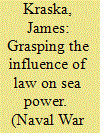

|
|
|
| 10 |
ID:
093913
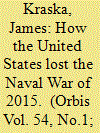

|
|
|
|
|
| Publication |
2010.
|
| Summary/Abstract |
Years of strategic missteps in oceans policy, naval strategy and a force structure in decline set the stage for U.S. defeat at sea in 2015. After decades of double-digit budget increases, the People's Liberation Army (Navy) was operating some of the most impressive systems in the world, including a medium-range ballistic missile that could hit a moving aircraft carrier and a super-quiet diesel electric submarine that was stealthier than U.S. nuclear submarines. Coupling this new asymmetric naval force to visionary maritime strategy and oceans policy, China ensured that all elements of national power promoted its goal of dominating the East China Sea. The United States, in contrast, had a declining naval force structured around 10 aircraft carriers spread thinly throughout the globe. With a maritime strategy focused on lower-order partnerships, and a national oceans policy that devalued strategic interests in freedom of navigation, the stage was set for defeat at sea. This article recounts how China destroyed the USS George Washington in the East China Sea in 2015. The political fallout from the disaster ended 75 years of U.S. dominance in the Pacific Ocean and cemented China's position as the Asian hegemon.
|
|
|
|
|
|
|
|
|
|
|
|
|
|
|
|
| 11 |
ID:
087408
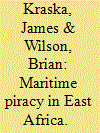

|
|
|
|
|
| Publication |
2009.
|
| Summary/Abstract |
The threat of maritime piracy exists in the Horn of Africa as a result of the desperate situation in Somalia and the devastated political economy along the coastline. Ina an area where one attack can yield $10,000 for a working level pirate, such criminal activities have flourished
|
|
|
|
|
|
|
|
|
|
|
|
|
|
|
|
| 12 |
ID:
108733
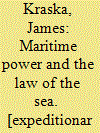

|
|
|
|
|
| Publication |
Oxford, Oxford University Press, 2011.
|
| Description |
xix, 464p.
|
| Contents |
Includes bibliographal references and index.
|
| Standard Number |
9780199773381
|
|
|
|
|
|
|
|
|
|
|
|
Copies: C:1/I:0,R:0,Q:0
Circulation
| Accession# | Call# | Current Location | Status | Policy | Location |
| 056383 | 341.448/KRA 056383 | Main | On Shelf | General | |
|
|
|
|
| 13 |
ID:
092076
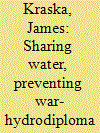

|
|
|
|
|
| Publication |
2009.
|
| Summary/Abstract |
Over the past decade, scholars have closely examined the linkage between environmental change, security, and conflict. Severe deforestation, soil erosion, soil salinisation and water-logging, toxic contamination, drought and flooding, and air and water pollution are some of the environmental calamities that can increase international tension and even lead to conflict. What is perhaps more interesting, however, is that reversing the equation is also true. Environmental conservation and cooperative governance between neighbouring states can contribute to regional stability and conflict avoidance. This article suggests the international trans-boundary river agreement between India and Pakistan to manage the Indus River reduces tension and prevents war between the nuclear-armed rivals. During the Kargil crisis in 2001, for example, the trans-boundary river management regime was the most functional bilateral relationship between the two South Asian powers.
|
|
|
|
|
|
|
|
|
|
|
|
|
|
|
|
| 14 |
ID:
087704
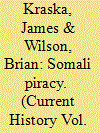

|
|
|
|
|
| Publication |
2009.
|
| Summary/Abstract |
On April 12, US Navy Seals staged a dramatic
rescue of an American cargo ship
captain who had been held hostage during
a five-day standoff in the Indian Ocean. The
episode highlighted a problem that has drawn
increasing international attention over the past
year: piracy off the Somali coast. Approximately
125 ships carrying cargo that included oil, weapons,
and chemicals were attacked in 2008. In the
first two months of 2009, another 30 ships were
attacked near Somalia.
To be sure, armed gangs demanding ransom
have successfully boarded only a small fraction of
the 33,000 vessels that annually ply the region's
strategically important waters-waters that include
the Gulf of Aden, the key gateway to trade between
the East and West. Still, several seamen have been
killed or injured, and the global merchant shipping
supply chain has been adversely affected (for
instance through increased insurance premiums).
Some vessels, especially slower ships with low freeboards,
have opted to avoid the area altogether.
|
|
|
|
|
|
|
|
|
|
|
|
|
|
|
|
| 15 |
ID:
090168
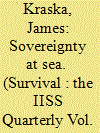

|
|
|
|
|
| Publication |
2009.
|
| Summary/Abstract |
In March 2009 the Chinese conducted bold and dangerous manoeuvres against the USNS Impeccable, a US Navy military survey vessel operating about 120 kilometres from the island of Hainan in the South China Sea. Five Chinese government vessels, including a Navy intelligence-collection ship, a Bureau of Maritime Fisheries patrol vessel, a State Oceanographic Administration patrol vessel, and two small Chinese-flagged trawlers, surrounded and blocked the transit of the US vessel in international waters. In an odd turn, a Chinese vessel approached within 8 metres of the American ship in an attempt to cut its towed array; when the Impeccable engaged the Chinese vessel with fire hoses to repel it, the Chinese crew stripped to their underwear. The event marks the first test of the Obama administration regarding China's efforts to reshape the legal regime that applies to the littoral zone under the 1982 Law of the Sea Convention. Beijing provoked a similar crisis early in 2001 at the start of President George W. Bush's first term, when a Chinese interception of an American EP-3 surveillance aircraft flying in international airspace over the East China Sea caused a mid-air collision and the loss of the Chinese fighter jet and pilot, and required an emergency landing of the US aircraft on Hainan. 'Innocent passage by naval vessels from other countries in the territorial waters in the special economic zone is acceptable, but not allowed otherwise', a senior spokesman in Beijing stated after the March 2009 incident.
|
|
|
|
|
|
|
|
|
|
|
|
|
|
|
|
|
|
|
|
|